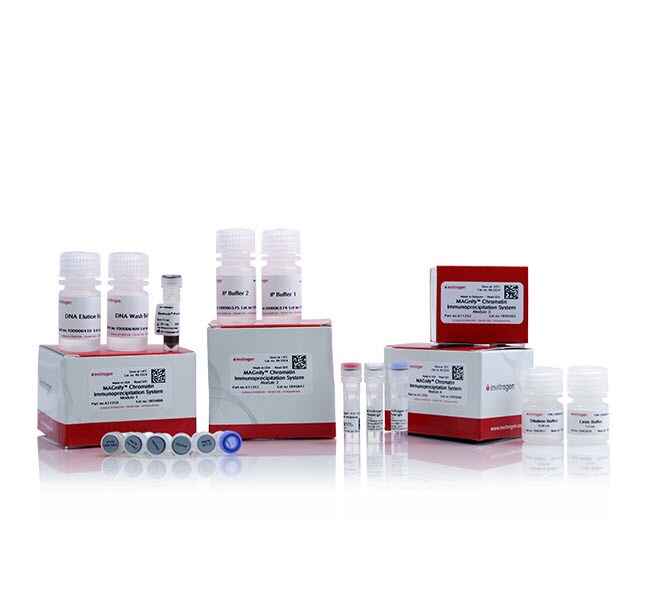
The MAGnify™ Chromatin Immunoprecipitation System provides a streamlined, optimized assay for the enrichment of chromatin/protein complexes and DNA recovery using magnetic bead capture technology. The isolated DNA is ready for downstream analysis by methods such as PCR- or qPCR-based assays, or massive parallel DNA sequencing.
ChIP
Chromatin immunoprecipitation (ChIP) is a powerful technique for studying the association of certain proteins with specific regions of the genome. These sequence-specific DNA-binding proteins are believed to play a role in such cellular processes as DNA replication, recombination, repair, and segregation; chromosomal stability; cell-cycle progression; and epigenetic silencing. In a standard ChIP assay, a cell is fixed via formaldehyde treatment and the chromatin is sheared and immunoprecipitated via a highly specific antibody. The researcher then analyzes the DNA to identify the genomic regions where the chromatin-associated proteins bind to the chromatin in vivo. This kit enables researchers to start with lower sample amounts than traditional ChIP workflows, thereby preserving precious samples, and the protocol can be completed in a single day, compared with 2–3 days for a traditional ChIP assay. The kit can be used with our suite of ChIP-validated antibodies, and is also complementary with MethylCode™ and NCode™ products for downstream epigenetics research.
Using the MAGnify™ system
When using the MAGnify™ system, you treat cells or tissue with formaldehyde to generate protein-protein and protein-DNA crosslinks between molecules in close proximity within the chromatin complex. The cells are then lysed, and the chromatin is released from the nuclei and sheared by sonication to reduce the average DNA fragment size to 200–500 bp for analysis by quantitative real-time PCR (qPCR) or 100–300 bp for analysis by massive parallel DNA sequencing. You then immunoprecipitate and isolate the crosslinked protein of interest using a specific ChIP-qualified antibody conjugated to Dynabeads™ Protein A/G. The formaldehyde crosslinking is reversed by heat treatment, and the DNA associated with that protein is purified. The DNA is now ready for downstream analyses such as end-point PCR or quantitative PCR (qPCR), genome-wide analyses using promoter-tiling arrays, or next-generation sequencing. In PCR/qPCR analysis, primers are designed to span the desired DNA sequence of interest, and the data demonstrates whether the specific protein of interest is associated in vivo with that DNA region.
| Code | Description |
|---|---|
| 492024 | Catalog Number: 492024 |

